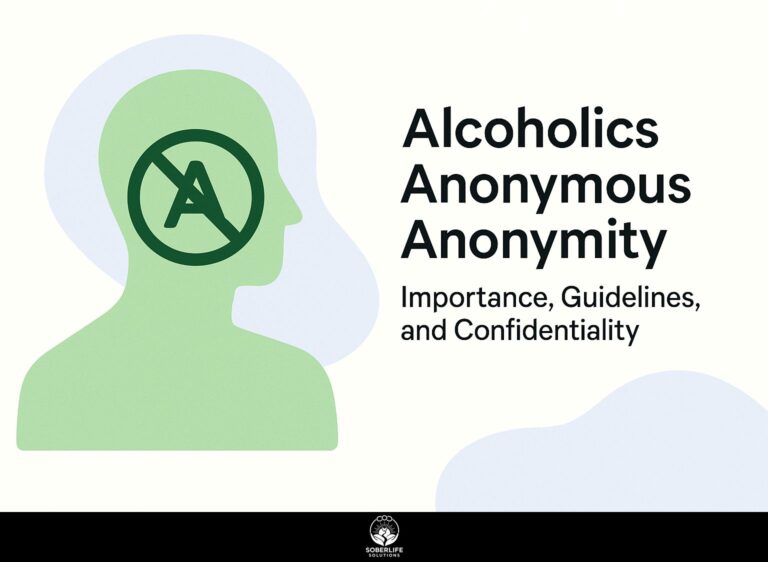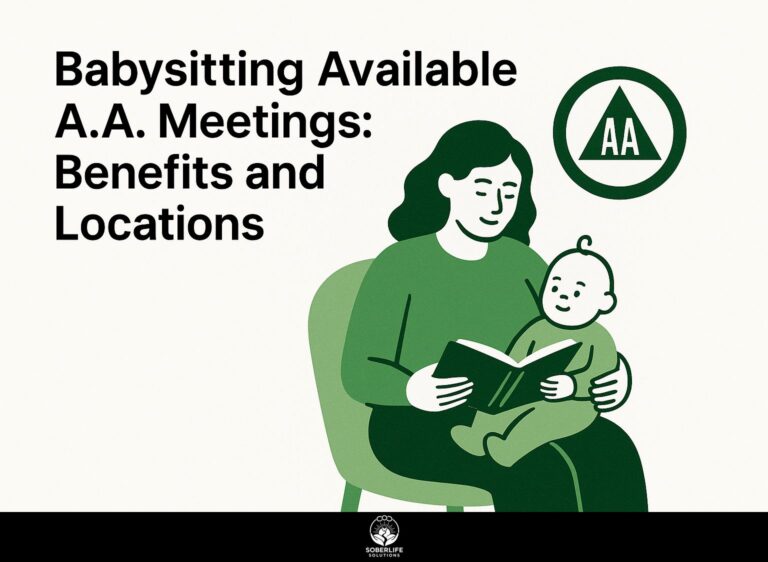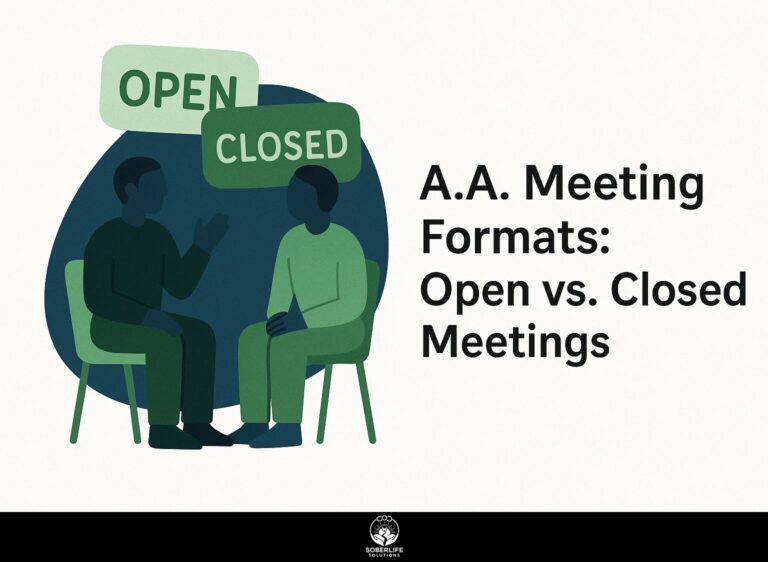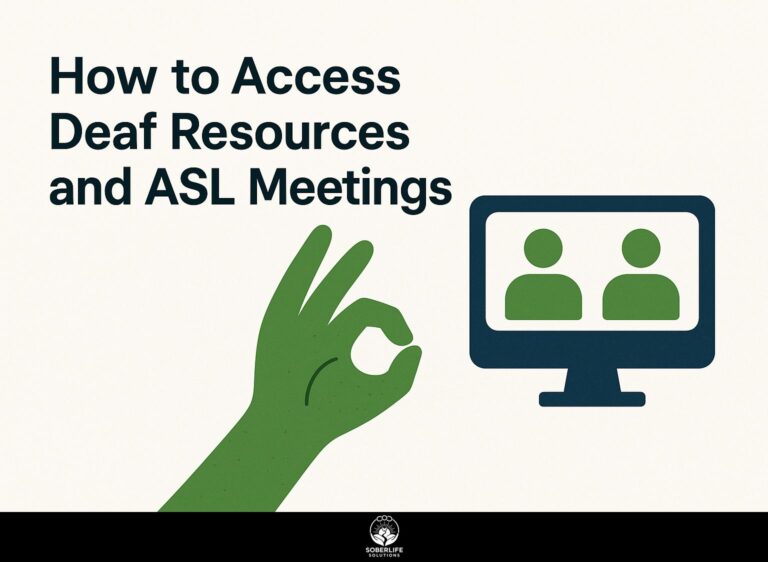A.A. Meetings: Support, Importance, and How to Join for Beginners
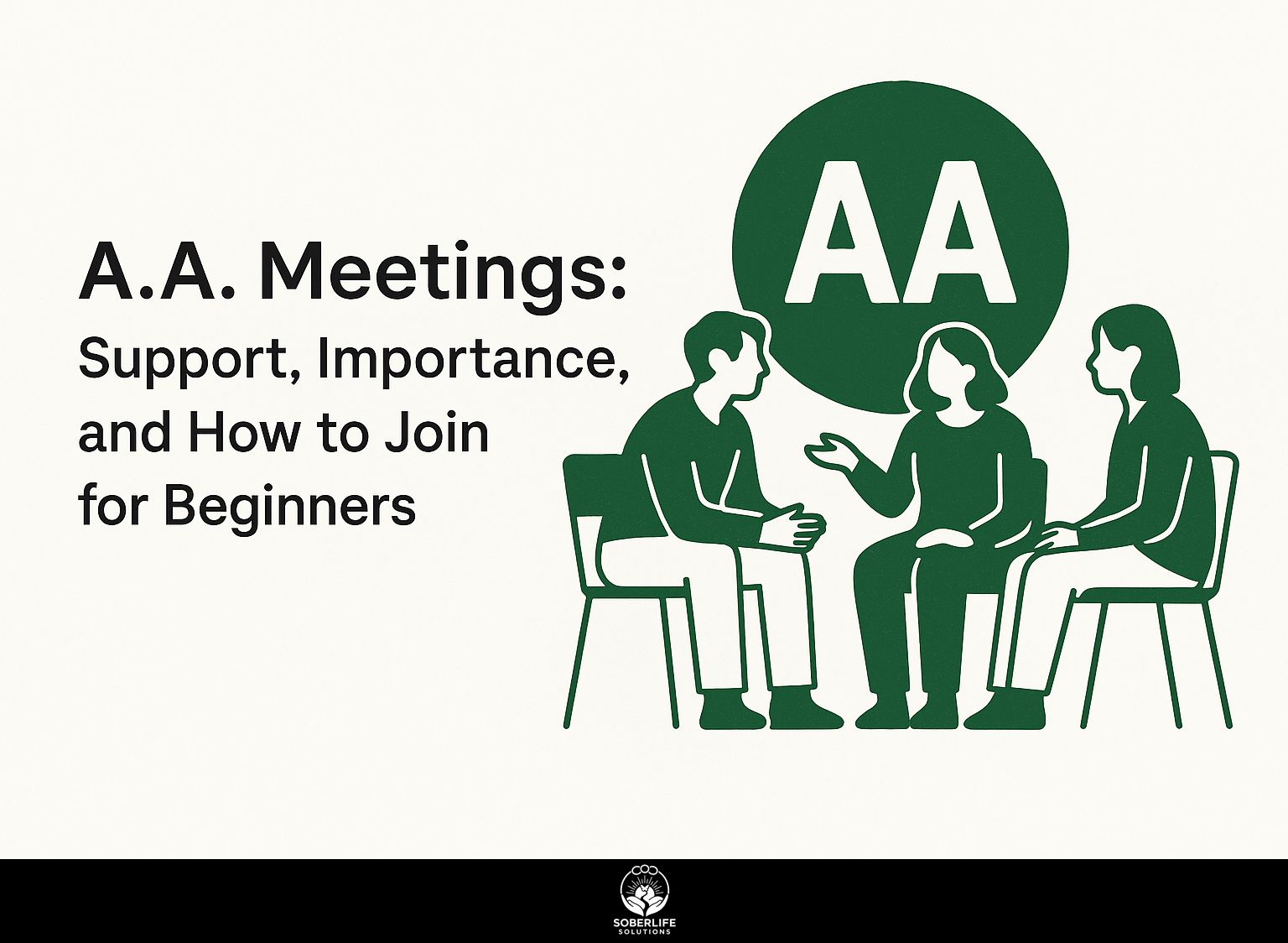
Struggling with alcohol addiction? Meetings organized by Alcoholics Anonymous, started by Bill Wilson, offer important help for people aiming to recover. In this article, we’ll discuss why these meetings matter, the community they build, and how newcomers can join easily. Learn how Alcoholics Anonymous can help you tackle difficulties and lead a healthier life without alcohol.
Key Takeaways:
What is Alcoholics Anonymous?
Alcoholics Anonymous (A.A.) is a global fellowship founded in 1935 that emphasizes peer support and the Twelve Steps to help individuals recover from alcohol addiction. According to Wikipedia’s overview of Alcoholics Anonymous, the organization provides a structured approach to recovery.
A.A. operates without charging membership fees. It relies on donations to pay for expenses, allowing anyone to join regardless of their financial situation.
The structure is rooted in anonymity, allowing members to share openly about their struggles in a safe space. To further understand the importance and guidelines of maintaining confidentiality, A.A. ensures that all members feel secure and supported.
The Big Book is an important part of A.A. It explains the Twelve Steps and includes personal recovery stories, acting as a guide and a source of encouragement for members.
This group method increases personal commitment and builds a feeling of togetherness.
History and Development
Founded by Bill Wilson and Dr. Bob Smith, A.A. evolved from a small group of alcoholics into a worldwide movement, shaping recovery methods for millions.
In 1939, A.A. released its main text, the “Big Book,” which explained the Twelve Steps and included personal recovery stories, greatly increasing its visibility and reach.
By the 1950s, the General Service Office in New York became a key part of organizing and coordinating activities. The creation of regional chapters further facilitated growth, enabling local groups to support one another.
Today, A.A. has expanded to over 180 countries, offering fellowship and hope to countless individuals facing addiction. This expansive growth aligns with historical insights from Wikipedia, which chronicles A.A.’s evolution and global impact.
Support Offered in A.A. Meetings
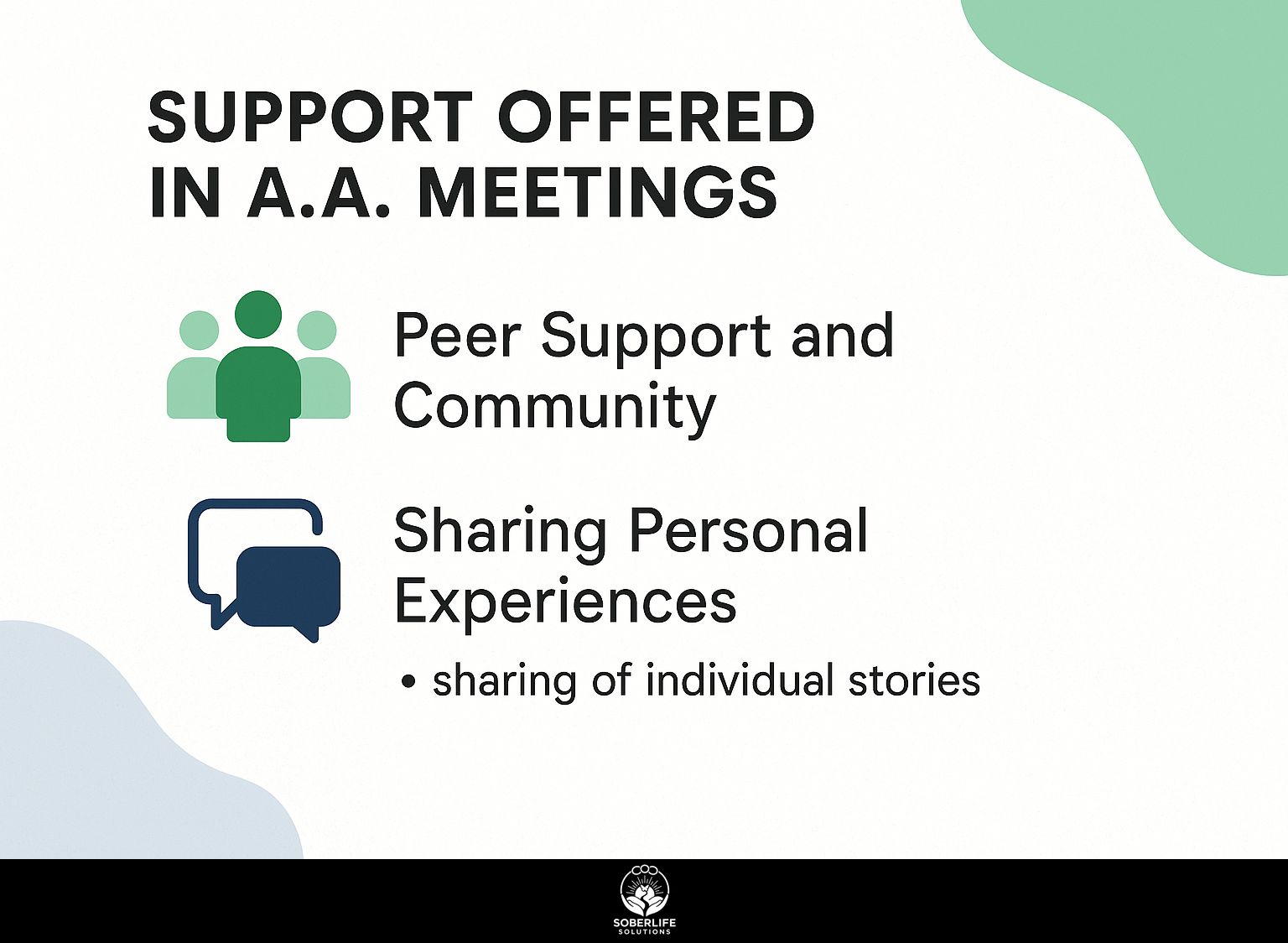
A.A. meetings offer a special place where people can find peer support and emotional connection, which are important for staying sober. For those looking to understand the various formats available, the principles of open and closed meetings, discussed in our guide on A.A. meeting formats, highlight how these settings cater to different needs and preferences.
Peer Support and Community
The foundation of A.A. lies in its community-centric approach, where members find strength and encouragement through shared experiences and peer interactions.
Many people successfully overcome challenges by building friendships and support systems within A.A. For instance, members frequently share their own experiences during meetings, creating a feeling of community and connection.
Accountability partners create a dual commitment to sobriety, regularly checking in with each other. Tools such as A.A.’s hotline or the ‘Find a Meeting’ app improve this connection by offering quick help for those who need it. According to a recent publication by SAMHSA, peer support workers play a crucial role in helping individuals navigate their recovery journey, providing essential guidance and encouragement.
These connections help people remain sober and create a welcoming space where they can recognize achievements together. This approach aligns with the principles outlined in our analysis of Recovery Communities: Finding and Engaging in Support.
Sharing Personal Experiences
Members are encouraged to share their personal stories, creating an atmosphere of openness that helps to alleviate the isolation often felt by those struggling with Alcohol Use Disorder.
This storytelling serves to encourage transparency, create connections, and inspire optimism.
For people who are new, listening to others talk about similar challenges makes their own experiences feel less overwhelming and helps them feel part of the group. Stories about overcoming challenges and personal development can motivate people to change, demonstrating that change can happen.
To improve this process, facilitators might propose topics for discussion, such as difficulties faced or key moments in recovery, which can lead to more useful conversations and connections among participants.
The Importance of A.A. Meetings
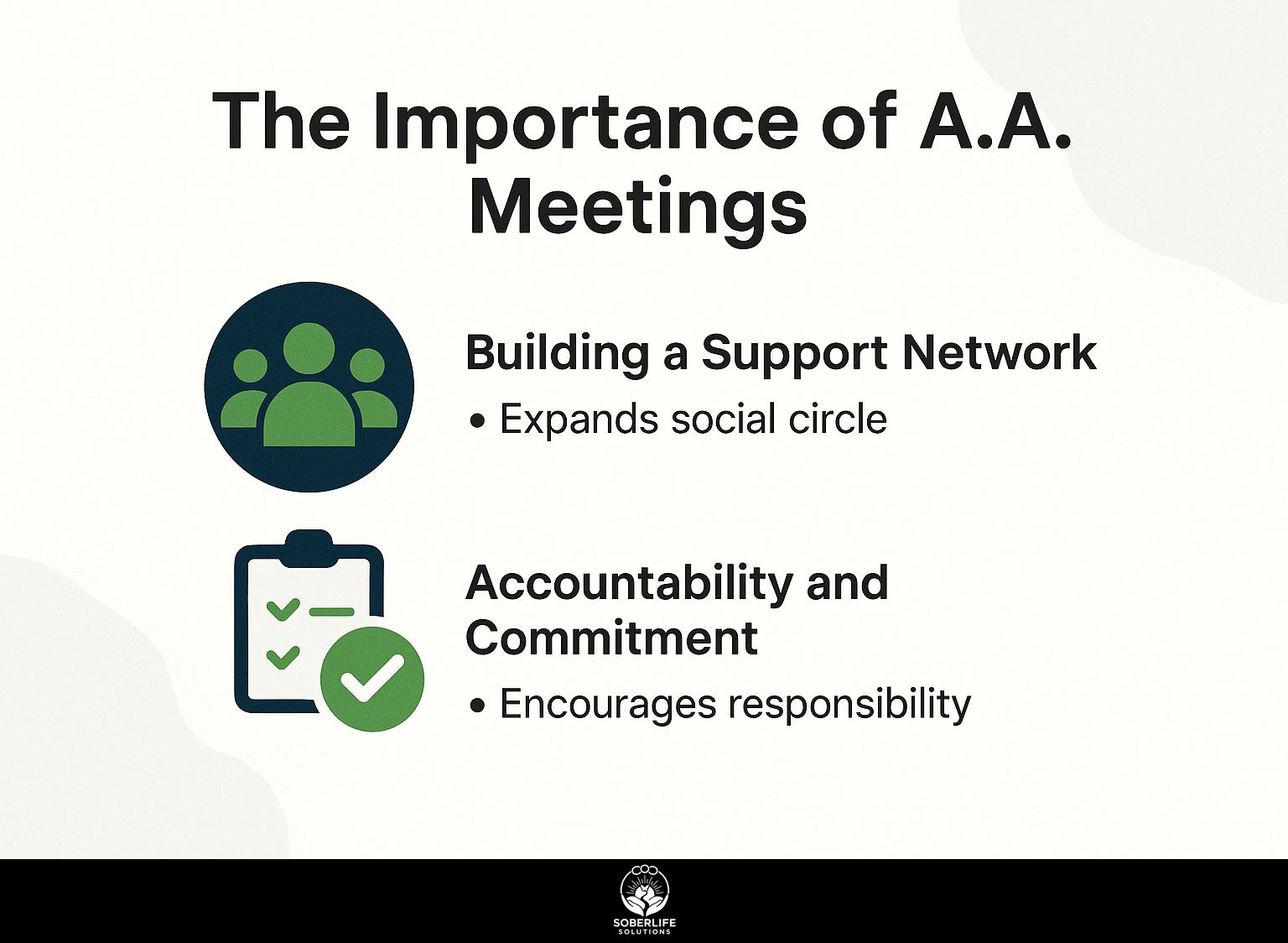
A.A. meetings are important for creating a support system. People develop responsibility and commitment to staying sober by regularly attending and participating.
Building a Support Network
Going to A.A. meetings regularly helps people build a dependable support system that is important for staying sober and handling situations that may cause a relapse.
Creating connections within A.A. promotes a setting where people share their experiences and support each other. For example, having a sponsor means you have someone to keep you on track; they can help you face difficulties and give advice.
Participating in group discussions allows members to share personal stories, creating a sense of belonging.
Participating in social events organized by A.A. helps build relationships and creates new friendships that can provide extra support outside of meetings.
These networks often create strong connections, greatly improving recovery paths and supporting lasting sobriety.
Accountability and Commitment
Going to A.A. meetings regularly helps people feel accountable, which is important for staying sober and getting better results in recovery.
This accountability is further strengthened through the sponsorship model, where experienced members guide newcomers. Sponsors, usually people with a successful history in recovery, guide others through the Twelve Steps.
These steps help individuals take responsibility for their actions and think about their past behavior and any issues they have caused. Talking about personal experiences in groups helps create a supportive setting, strengthening each person’s dedication to staying sober.
By joining this organized support system, participants stay accountable and learn and find encouragement from others in the community.
Types of A.A. Meetings
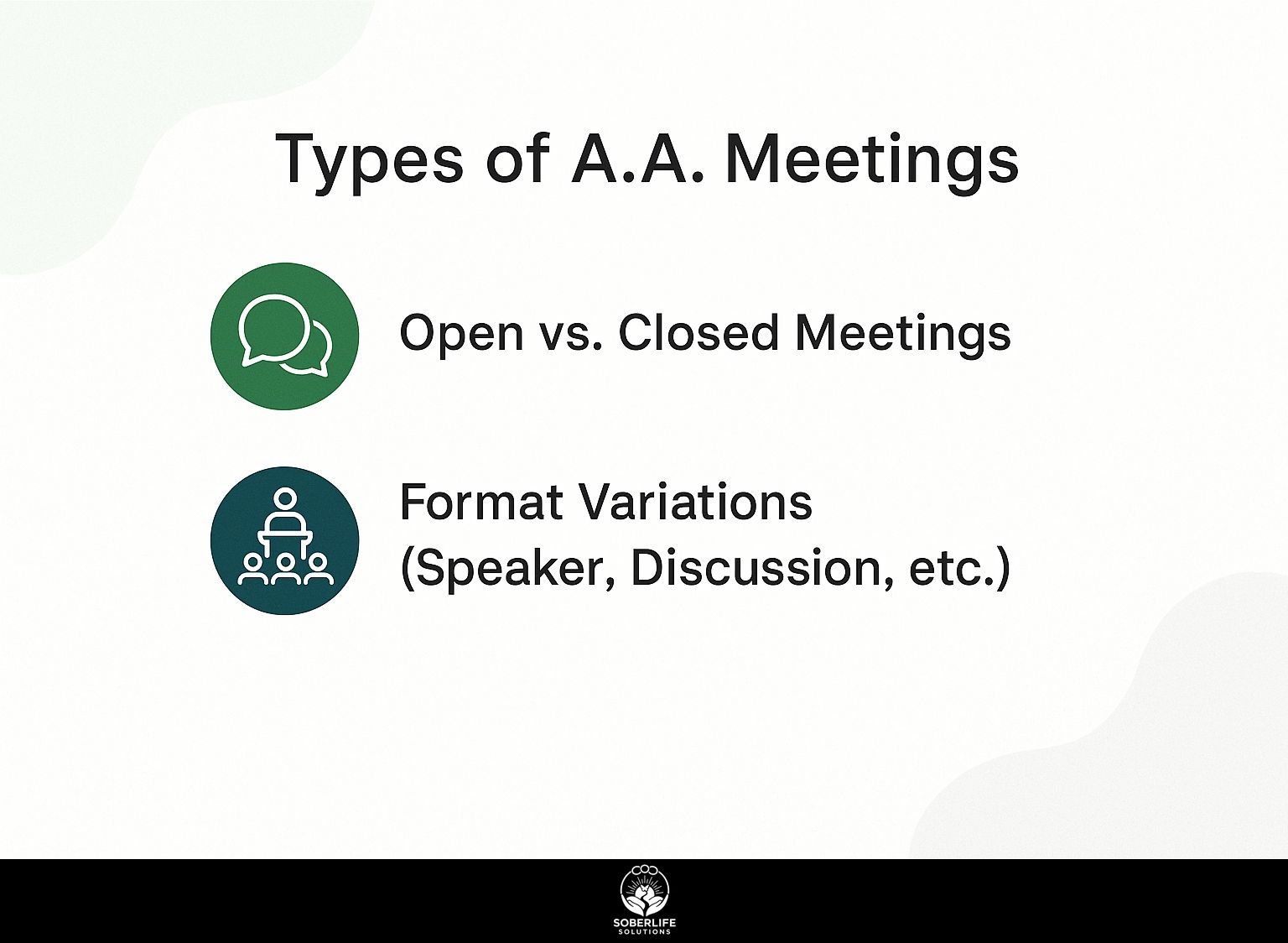
A.A. offers different types of meetings to suit various needs.
Open meetings welcome anyone interested in recovery, while closed meetings are for members only.
Worth exploring: A.A. Meetings: Formats, Benefits, and Key Reflections to understand the comprehensive benefits and different formats available for attendees.
Open vs. Closed Meetings
Open meetings welcome anyone interested in A.A., providing an opportunity for family and friends to understand the recovery process, while closed meetings are exclusive to those with a desire to stop drinking.
Open meetings welcome a variety of people, creating a feeling of togetherness and encouragement. They often let participants listen to personal experiences and learn about the recovery process, which can be very helpful for family and friends.
Unlike open meetings, closed meetings provide a secure environment where people wanting to quit drinking can talk about their experiences without fear of being judged by outsiders. This privacy can encourage honesty and deeper sharing, furthering personal growth.
Both types of meetings are important in the recovery process, serving various needs within the A.A. community.
Format Variations (Speaker, Discussion, etc.)
A.A. meetings vary in format, including speaker meetings, discussion groups, and study sessions focused on the Big Book, each offering unique advantages for participants.
Speaker meetings usually have one person talking about their experiences, giving motivation and thoughts that connect with others.
Discussion groups, on the other hand, invite people to join in and share their stories, building a feeling of belonging.
Big Book study sessions focus on the main text, helping members learn the program’s principles.
Think about going to various types of meetings to find out which one works best for your personal recovery process, as trying different ones can increase your involvement and help.
How to Join A.A. Meetings
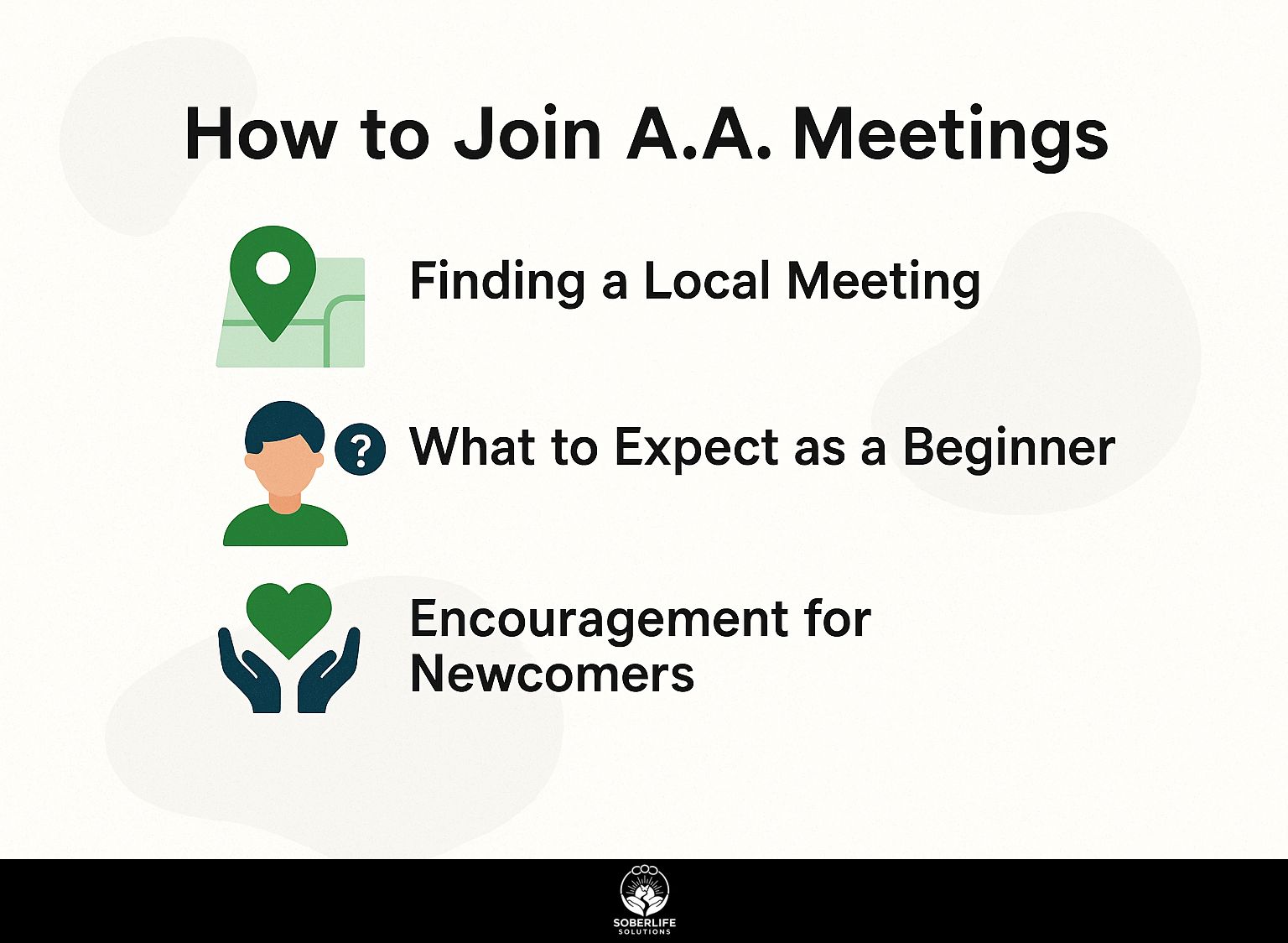
Joining A.A. is simple. Newcomers should look for a local meeting that fits them, offering quick support and resources. For those seeking convenience and flexibility, consider participating in virtual gatherings. You can easily learn the process of attending online meetings by following our step-by-step guide on joining online AA meetings.
Finding a Local Meeting
People can quickly find nearby A.A. meetings by visiting the Alcoholics Anonymous World Services website, which provides a complete list of meetings organized by location.
In addition, local intergroup resources often have updated information on meetings, including those that may be less publicly listed. Many places also provide phone numbers you can call for help.
For smartphone users, the Meeting Guide app is a useful tool that shows nearby meetings and provides details about the group type and whether the meetings are open or closed. Using these resources makes it easy to stay in touch and get help during your recovery.
What to Expect as a Beginner
New members of A.A. will find a friendly place where they can hear others, talk about what they’ve been through, and understand the recovery process in an organized setting.
- Usually, a meeting starts with participants saying their first names, helping them connect with each other.
- Following this, members often have a designated time to share their experiences or feelings.
This sharing can be a powerful way for newcomers to understand that they are not alone in their struggles. To finish, the group might talk about upcoming events or subjects for later meetings, keeping things connected.
For newcomers, it can be helpful to prepare a simple sharing point in advance to ease anxiety and feel more engaged.
Encouragement for Newcomers
For those new to A.A., know that you are not alone; many have walked this path and found strength in the community’s support and shared experiences.
In A.A., you’ll find a wealth of resources designed to aid your recovery. Going to meetings often can help you connect with and learn from others who share your experiences.
Many newcomers benefit from pairing up with a sponsor who offers guidance through the 12 Steps. Exploring literature like ‘Alcoholics Anonymous: The Big Book’ can offer inspiration and practical advice.
Remember, your progress is unique to you-celebrate small victories and stay engaged with the community for ongoing encouragement.
Frequently Asked Questions
What are A.A. meetings and how do they provide support?
A.A. meetings are groups of people who want to quit drinking alcohol. These meetings offer a safe and supportive place where members can talk about their experiences, challenges, and achievements with others who know what they are going through.
Why are A.A. meetings important for beginners?
A.A. meetings are helpful for newcomers because they provide a group and support for people beginning their road to sobriety. They provide a non-judgmental space where beginners can learn from others, gain encouragement, and receive practical advice on how to overcome their addiction.
How can I join an A.A. meeting for beginners?
To join an A.A. meeting, you can simply attend one of the many meetings available in your local area. A quick Google search or a visit to the A.A. website can help you find a meeting near you. You can also reach out to a local A.A. group or hotline for more information and guidance in joining a meeting.
Do I have to speak at an A.A. meeting as a beginner?
No, you do not have to speak at an A.A. meeting if you are not comfortable doing so. Some meetings may have a designated time for sharing, but you are not obligated to participate. You can simply listen and observe until you feel ready to share your own story.
What is the role of a sponsor in A.A. meetings for beginners?
A sponsor is an experienced A.A. member who acts as a guide and mentor for beginners in the program. They offer personal support, share their own experiences, and provide guidance on the 12 steps of recovery. Having a sponsor can be very helpful for beginners as they work towards staying sober.
Are there any fees to join A.A. meetings for beginners?
No, A.A. meetings do not charge any fees for membership. In the spirit of self-support, members may contribute a small amount of money to help cover the cost of meeting expenses, but this is entirely voluntary. A.A. welcomes everyone who wants support, no matter their money situation.

